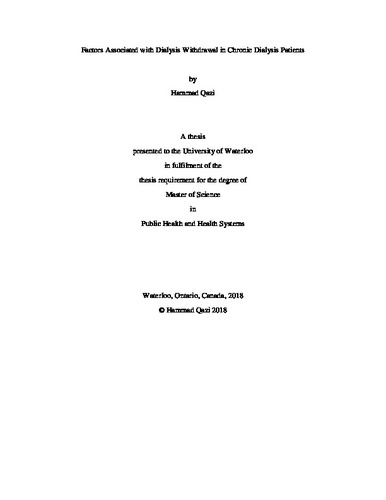| dc.description.abstract | Background: Research on the factors associated with dialysis withdrawal in chronic dialysis patients has been limited. Authors and clinicians have used different definitions for dialysis withdrawal, resulting in inconsistent findings. This thesis explored the factors associated with dialysis withdrawal defined as “patient refused further treatment or voluntary withdrawal from the dialysis program” in chronic dialysis patients.
Methods: This retrospective study extracted patient information from the electronic renal patient management system Nephrocare™, and ClinicalConnect™ at the Grand River Hospital. A total of (N=723) patients who initiated chronic renal dialysis therapy (>30 days of duration) in renal dialysis program at Grand River Hospital (GRH), Ontario, during the period from 1st January, 2012 to 30th September, 2017 were consecutively included in the study. Patients with acute dialysis or patients receiving dialysis before the start of the study were excluded. Age, sex, modality, comorbidities such as diabetes, cardiac disease, hypertension, vascular disease, lung disease, malignancy, dementia, depression and bipolar disorder and aetiology of kidney disease were selected as hypothesis variables and duration of dialysis was the controlled variable in this study.
Results: The mean age of the sample was 64.86 years (±14.89) with 62.8% (n=454) males. The most common cause of renal disease was diabetes (33.6%) and the most common comorbidity was hypertension (94.5%). The mean duration of dialysis was 544.80 days (±486.83) days. The prevalence of dialysis withdrawal was 9.41% (n=68) with psychosocial (n= 16; 23.5%) being the most common reason. The final logistic regression model showed that cardiac disease, [= 0.6530; p=0.016], hypertension [= 1.7421; p=0.019], dementia [=1.1125; p=0.008] and age [=0.0342; p=0.002] were significantly associated with dialysis withdrawal, with significant influence of duration of dialysis [=-0.000841; p=0.0092] as a confounder on the above relationship.
Conclusion: The study showed age, cardiac disease, hypertension and dementia are significant predictors related to dialysis withdrawal in chronic dialysis population. The findings may help in identifying patients who are susceptible to dialysis withdrawal at the start of dialysis. Future researchers and nephrologists should design and conduct intervention studies focusing on strategies controlling the severity of comorbidities (cardiac disease and hypertension), regular assessment and monitoring of the progression of dementia, and other dialysis program changes to decrease dialysis withdrawal rates in chronic dialysis patients. | en |

